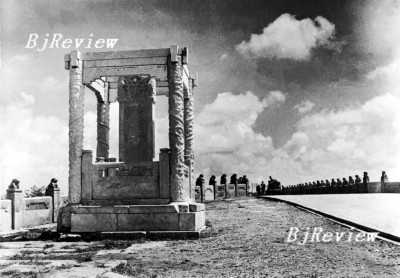 It is only natural that scholars from different countries hold varying or even conflicting views on historical issues. However, the joint history study program between Chinese and Japanese historians aimed at smoothing over sharp differences on historical issues has caught the world's eye since its first session was convened in Beijing last December.
It is only natural that scholars from different countries hold varying or even conflicting views on historical issues. However, the joint history study program between Chinese and Japanese historians aimed at smoothing over sharp differences on historical issues has caught the world's eye since its first session was convened in Beijing last December.
China-Japan relations hit a rough patch largely because of the historical issues. As the two try to mend their ties, their leaders agreed to launch the program to jointly study these issues. What is the nature of these issues? Why have they affected bilateral relations so seriously?
A troubled past
As is well known, China and Japan have a long history of bilateral relations. For most of the time, the two neighbors enjoyed peaceful and friendly ties. Trouble did not befall them until modern times. In the mid-19th century, East Asian nations, including China and Japan, were forced to open their doors under the military and political pressure of Western colonial powers. They all risked being colonized by the West. Japan was the first to get rid of this risk. However, it treated other East Asian countries the way it had been treated by the colonialists, turning Korea into its colony and launching brutal aggression against China. These moves cast a dark shadow over the history of East Asia.
It has been over six decades since World War II ended in 1945. Had the war been clearly defined as a war of aggression, and had Japan accepted the just trials of its war crimes, taken responsibility for the war and learned the historical lesson that it should pursue peaceful development, no major contentions would have broken out between China and Japan and between South Korea and Japan over their wartime history.
Some people in Japan asserted that the "history issue" was purposely created by China. Others argued that wartime history had not become a problem in China-Japan relations until 1998. However, a review of postwar Japanese history renders these arguments invalid.
After Japan surrendered, anti-fascist countries tried Japan's war crimes in international tribunals. In an effort to return to the international community, Japan stated in the San Francisco Peace Treaty of 1951 that it accepted the judgments of the International Military Tribunal for the Far East and other allied war crimes courts both within and outside Japan.
In the Sino-Japanese Joint Statement issued in 1972 to normalize bilateral relations, Japan made the announcement that it was "keenly conscious of the responsibility for the serious damage that Japan caused in the past to the Chinese people through war, and deeply reproaches itself." This position was later reaffirmed in the Sino-Japanese Treaty of Peace and Friendship (1978) and the Sino-Japanese Joint Declaration (1998). It was also echoed by Japanese Emperor Akihito when he visited China in 1992.
Despite these reiterations, extreme nationalism has made a comeback in Japan since the beginning of the Cold War. Attempts were continuously made to rewrite Japan's wartime history by redefining the invasion of its neighbors as "self-defense" and "a war of Asian national liberation."
Japan rose to become the world's second largest economic power only next to the United States in the mid-1980s. Politicians anxious to make Japan a major political power believed that the war crimes trials constituted a stumbling block in their endeavor. So, they argued that it was wrong to hold Japan accountable for the aggressive war, and the "glory of the nation" should be underscored in history studies to imbue the Japanese with a sense of pride.
In this political context, some Japanese politicians set about whitewashing Japan's wartime conduct. For example, in 1986, then Minister of Education, Culture, Sports, Science and Technology Masayuki Fujio told reporters that the annexation of Japan and Korea was an agreement between the two countries and Korea was also responsible for that. Then Director General of the National Land Agency Seisuke Okuno said in 1998 that Japan fought to protect itself at a time when the white race had turned Asia into a colony, denying that Japan had been the aggressor in the war fought between 1937 and 1945.
| 